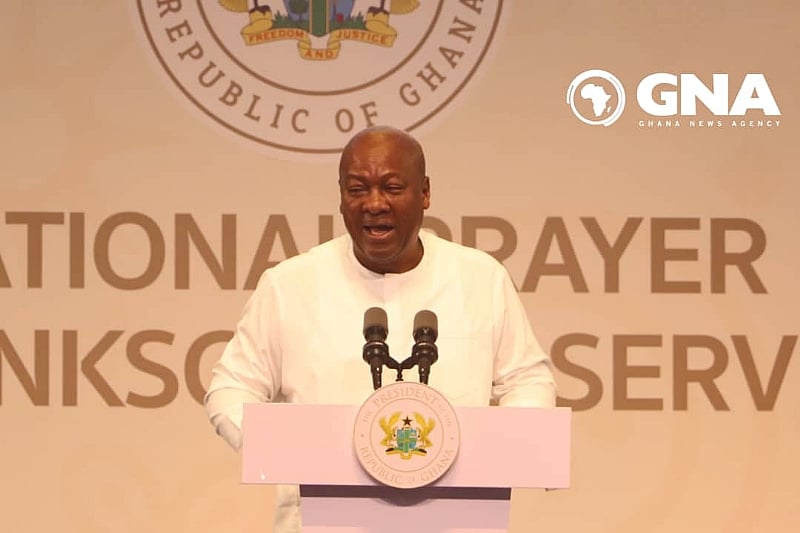President John Dramani Mahama, in a resounding declaration at the Christian National Thanksgiving Service in Accra, emphasized his government’s unwavering commitment to combating corruption. He stressed that his administration would not tolerate “business as usual” and that all appointees would be held to the highest ethical and professional standards. This commitment, he explained, stemmed from the understanding that corruption erodes the very foundation of society. He issued a clear warning to those seeking appointments, reminding them that public service is a stewardship of public resources and the trust of the Ghanaian people, not an opportunity for personal gain. Using a biblical analogy, he compared Ghana to the Garden of Eden, entrusted to its citizens to cultivate and protect.
President Mahama’s address underscored the importance of accountability and ethical conduct in public service. He explicitly stated that those entrusted with public office would be held to the highest standards of conduct, both ethically and professionally. His message aimed to create a culture of responsibility within his administration, ensuring that public resources are managed responsibly and for the benefit of all Ghanaians. He further reinforced this commitment by invoking a sense of divine stewardship, drawing a parallel between the care of the Garden of Eden and the responsibility of public officials to nurture and protect the nation’s resources. This analogy emphasized the moral obligation of public servants to act in the best interests of the country.
The President’s commitment extended beyond fighting corruption. He outlined a broad vision for Ghana’s future, encompassing economic revitalization, sustainable energy development, environmental protection, and equitable resource distribution. He acknowledged the magnitude of the challenges facing the nation but expressed confidence that through collective effort, innovation, and determination, these obstacles could be overcome. This comprehensive approach signaled his intent to address the multifaceted needs of the country, promoting not just ethical governance but also sustainable development and inclusive growth. His vision included empowering Ghanaians to benefit from the nation’s resources, ensuring that prosperity is shared and not confined to a select few.
President Mahama recognized the vital role of faith and prayer in national development. He quoted scripture, emphasizing the importance of humility, prayer, and seeking divine guidance in the process of national healing and progress. He pledged to seek counsel from religious leaders, acknowledging the importance of spiritual guidance in leadership. This emphasis on faith reflected his belief in the power of prayer and divine intervention in overcoming challenges and achieving national unity. He also urged all citizens to join in prayer for the nation’s peace, unity, and prosperity, highlighting the importance of collective spiritual engagement in achieving national goals.
The Thanksgiving Service itself served as a platform to express gratitude for a peaceful 2024 General Election, demonstrating the importance of national unity and peaceful democratic processes. The presence of dignitaries, including Vice President Jane Naana Opoku-Agyemang, First Lady Lordina Mahama, and key members of the National Democratic Congress (NDC), underscored the significance of the occasion. The event also highlighted the collaboration between the government and religious leaders in fostering national unity and spiritual well-being. The attendance of prominent religious leaders from various denominations further reinforced the message of unity and collective responsibility for the nation’s well-being.
The gathering of prominent religious leaders from diverse denominations underscored the importance of interfaith cooperation and unity in the nation’s spiritual life. The presence of figures such as Rev. Dr. Stephen Wengam, Rev. Sam Korankye Ankrah, Archbishop Nicholas Duncan-Williams, and Archbishop Charles Agyinasare, among others, demonstrated the broad reach of the event and its message of national unity and spiritual guidance. This diverse representation signaled a commitment to inclusivity and collaboration across religious lines in addressing national challenges and pursuing common goals. The collective presence of these spiritual leaders served as a powerful symbol of unity and the importance of faith in national life. Their participation amplified the message of seeking divine guidance in the pursuit of national progress and overcoming the challenges facing the nation.














